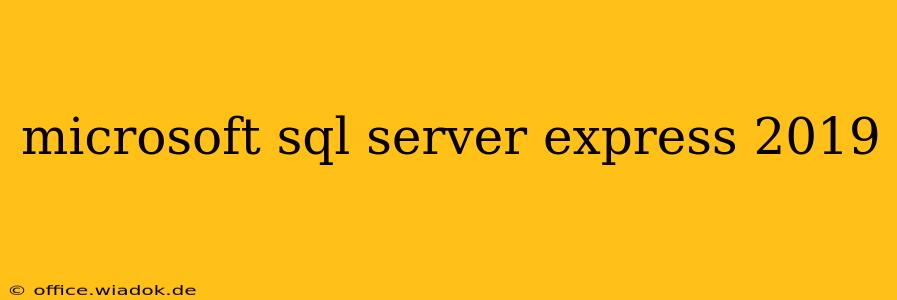Microsoft SQL Server Express 2019 is a free, lightweight edition of Microsoft's renowned relational database management system (RDBMS). Ideal for learning, development, and small-scale deployments, it offers a powerful subset of the features found in its enterprise-grade counterparts. This guide delves into its capabilities, limitations, and best use cases, providing a comprehensive overview for both beginners and experienced database administrators.
Understanding SQL Server Express 2019
SQL Server Express 2019 is a robust database engine designed for ease of use and accessibility. Its free licensing makes it a popular choice for individuals, students, and small businesses needing a reliable database solution without the cost of a full license. While it lacks some advanced features of its bigger siblings (like SQL Server Standard and Enterprise), it still provides a comprehensive set of tools for managing and querying data.
Key Features:
- Free License: Perhaps its biggest draw, the free license allows for unrestricted use for non-production environments.
- T-SQL Support: Express 2019 fully supports Transact-SQL (T-SQL), Microsoft's procedural extension to SQL, allowing for powerful data manipulation and management.
- Integration with Other Microsoft Products: Seamless integration with other Microsoft technologies, including Visual Studio and .NET, simplifies development workflows.
- Basic Management Tools: SQL Server Management Studio (SSMS) provides a user-friendly interface for managing databases, users, and other aspects of the system. Note that some advanced features within SSMS may require a licensed version of SQL Server.
- Relatively Low Resource Consumption: Designed to be lightweight, it can run efficiently on systems with modest hardware specifications.
Limitations of SQL Server Express 2019
While SQL Server Express 2019 offers significant value, it has some limitations compared to its paid counterparts:
- Database Size Limits: The maximum database size is limited to 10GB. This restriction can be a significant constraint for applications with large data storage needs.
- Feature Restrictions: Certain advanced features, such as advanced analytics, high availability options, and some security features, are not included.
- No Clustering Support: High availability and failover capabilities offered by clustering are not available in the Express edition.
- Limited CPU and Memory Allocation: Resource allocation is restricted, potentially impacting performance under heavy workloads.
Best Use Cases for SQL Server Express 2019
Despite its limitations, SQL Server Express 2019 is well-suited for various applications:
- Learning and Development: It's an excellent platform for learning SQL and database concepts.
- Small-Scale Applications: Ideal for small websites, applications, or projects with modest data storage requirements.
- Prototyping and Proof of Concept: Useful for building prototypes and testing applications before deploying them to a more powerful database server.
- Personal Projects: Perfect for individuals working on personal projects or hobby applications.
Alternatives to SQL Server Express 2019
If the limitations of SQL Server Express 2019 don't meet your needs, consider these alternatives:
- MySQL: A popular open-source relational database system known for its flexibility and scalability.
- PostgreSQL: Another robust open-source relational database system known for its adherence to SQL standards.
- SQLite: A lightweight, file-based database system often embedded directly into applications.
Conclusion
Microsoft SQL Server Express 2019 provides a powerful and accessible entry point into the world of relational databases. Its free license and ease of use make it a valuable tool for learning, development, and small-scale deployments. However, understanding its limitations is crucial before choosing it for a project. Careful consideration of your specific needs and resource requirements will determine if SQL Server Express 2019 is the right choice for you, or if a more robust alternative is necessary.

